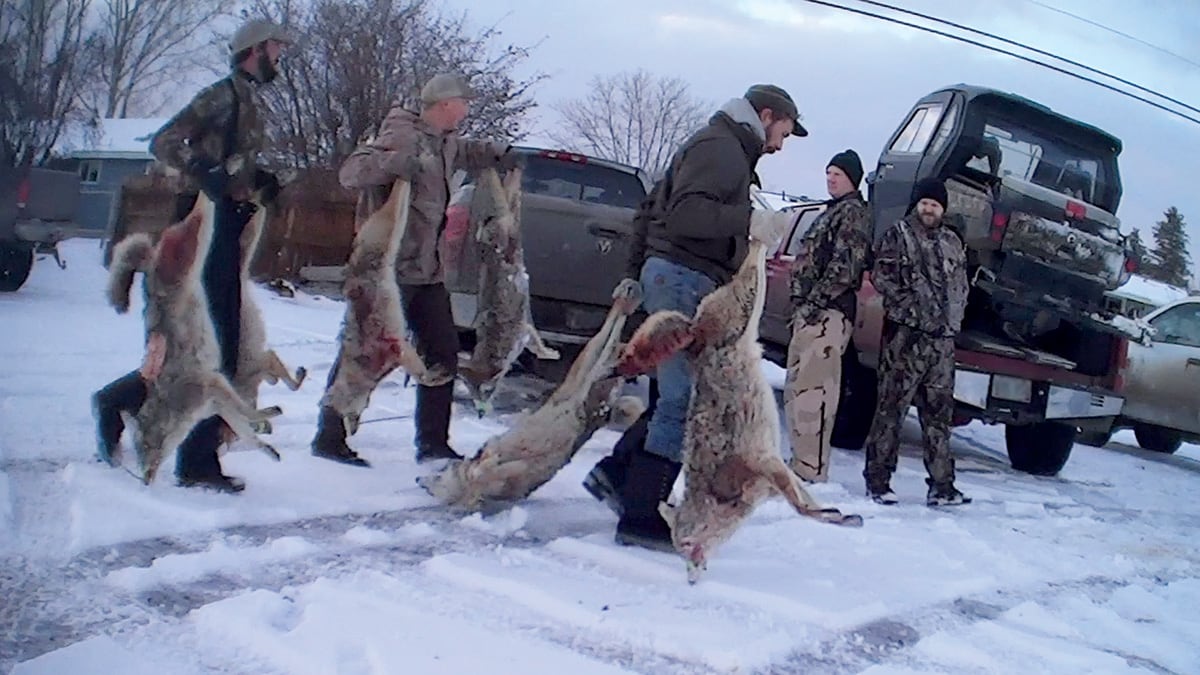A bill to ban coyote-hunting contests in Oregon has reignited conflict between conservationists and ranchers.
The battle dates back decades. Conservationists say mass coyote killings throw off ecosystem balance and violate hunting ethics. Ranchers say exterminating the predators is an act of preservation because coyotes attack their livestock.
The contests received renewed scrutiny this year after an undercover video shot by the Humane Society of the United States in January showed hunters at a competition in Burns, Ore., piling dozens of dead and bloody coyotes into the beds of pickup trucks.
So state lawmakers aimed to put a stop to such contests. Sens. Michael Dembrow (D-Portland) and Jeff Golden (D-Ashland) sponsored Senate Bill 723, which would outlaw "organizing, sponsoring, promoting, conducting or participating in contest, competition, tournament or derby that has objective of taking wildlife for prizes or other inducement or for entertainment."
But that last clause—entertainment—has created an unexpected roadblock for the bill.
The Oregon Hunters Association argues that SB 723 violates its members' First Amendment rights.
"Just because someone doesn't like something," association legislative chairman Paul Donheffner says, "doesn't mean it can be prohibited."
Donheffner's legal argument is straightforward: The bill doesn't ban coyote hunting, or even limit it. It merely outlaws contests for entertainment.
And Oregon's free speech laws offer broad protection for entertainment—thanks to a court ruling that protects strip clubs and adult video stores.
In 1987, in the case of State v. Henry, the Oregon Supreme Court decided under Article 1 Section 8 of the state constitution that state law could not criminalize forms of entertainment deemed socially unacceptable. That ruling enshrined legal protections for nudity at strip clubs in Oregon.
Lake Perriguey, a Portland lawyer with expertise in constitutional law, says, "Oregon's constitution limits what the government can regulate."
He adds: "The broad language has been interpreted to mean things people find unsavory. That's why you can have a porn shop across the street from an elementary school."
The American Civil Liberties Union of Oregon, which typically defends free speech cases, declined to comment on the bill.
Several lawmakers are trying to change the bill. The Senate Judiciary Committee, controlled by Democrats, is offering an amendment that removes the word "entertainment" from the bill's language.
Meanwhile, Sen. Kim Thatcher (R-Keizer) penned her own amendment, which would change the penalty of participating in a wildlife-killing contest from a misdemeanor to a violation.
Portland conservation group Oregon Wild supports SB 723. Arran Robertson, the group's communication manager, says, "Killing derbies go against what the vast majority of the hunting community considers to be fair. They're cruel and unnecessary."
Legislative testimony—signed by the Humane Society, Oregon Wild and 14 other statewide conservation groups—adds another argument: "Persecution of coyotes disrupts their social structure, which, ironically, encourages more breeding and migration, and ultimately results in more coyotes."
But the bill applies only to contests. Oregon Department of Fish and Wildlife regulations say it's legal to hunt and kill coyotes year-round with an appropriate furtaker's license.
Donheffner says there are over 25 Oregon Hunters Association chapters with more than 10,000 members statewide and that coyote-hunting contests have been their tradition for "years and years."
"It's nothing like the mass murder that's been described," Donheffner says, referring to the Humane Society videos.
Ranchers say the contests help them make ends meet. "I've had tough times when work was slow or I was injured and unable to work," wrote Seth Franklin, a rancher in Harney County who opposes the bill, in Senate testimony. "But one thing that's kept me afloat time and time again is fur, particularly coyotes."
